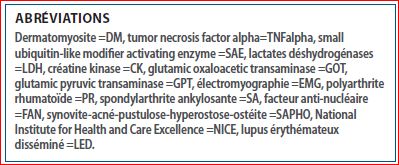Dermatomyositis (DM) is an autoimmune inflammatory disorder affecting the skin and muscles, whose etiology is often unknown. While DM induced by biological agents like anti-tumor necrosis factor-alpha agents is uncommon, this disorder is mainly seen in patients with autoimmune disorders or underlying neoplasms. We report the case of a 57-year-old female patient who developed DM with anti-small ubiquitin-like modifier-1 activating enzyme (anti-SAE 1/2) antibodies following an adalimumab treatment on account of refractory hidradenitis suppurativa. Our patient presented typical cutaneous findings consisting of heliotrope rash, Gottron papule, arthralgia, joint swelling, proximal muscle weakness, and dysphagia. Laboratory studies showed mild inflammatory syndrome, polyclonal hypergammaglobulinemia, hypoalbuminemia, high LDH levels, yet normal CK, AST, and ALT levels. Myositis-specific antibody assay was found to be positive for anti-SAE 1/2 antibodies. The electromyogram (EMG) and muscle biopsy revealed inflammatory myopathy. Systemic corticosteroid therapy was initiated. As a result, the patient’s joint pain and muscle strength both improved following 7 days of treatment. A clinical recurrence of the pathology occurred during the gradual regression of corticosteroid therapy, requiring the initiation of azathioprine with both good clinical and biological responses.
What is already known about the topic?
DM is an inflammatory myopathy affecting the skin and muscles, whose etiology is often unknown. In 20% of cases, myositis-specific antibodies are observed (1). Drug-related DM has well-known causes, with over half of the cases being secondary to hydroxyurea (2). In contrast, DM following a treatment with anti-TNF alpha agents is rather rare.
What does this article bring up for us?
When confronted with symptoms suggestive of DM in a patient treated with an anti-TNF-alpha agent, as demonstrated in our case report, such drugs must be considered as potential etiological agents. Any other etiology, in particular a neoplasm, must first be excluded. In the absence of compatible clinical symptoms, testing myositis-specific antibodies should be avoided. In most cases, adalimumab discontinuation is required to facilitate symptom regression. Given the growing use of anti-TNF-alpha agents, the clinician should be aware of this kind of complication.
Key Words
Dermatomyositis, tumor necrosis factor alpha inhibitors (anti-TNF-alpha agents), adalimumab
